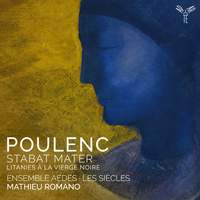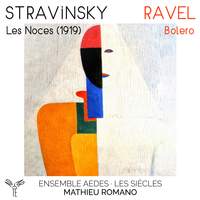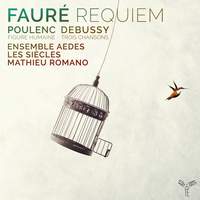Interview,
Mathieu Romano on Ensemble Aedes
Keen to find out more about an ensemble which had previously impressed me with an equally arresting recording of the original version of Stravinsky's Les Noces, I sat down with Romano last month to discuss the choir's genesis and evolution, their mission to be 'specialists of nothing', and Romano's 'first day of school' as a Masters at the Paris Conservatoire - which involved an inspiring, unexpected encounter with one of the giants of twentieth-century French music...
You're fast approaching Ensemble Aedes's twentieth birthday - how and when did the choir get off the ground?
I was a twenty-one-year-old student when I created the group with some friends I’d made through the conservatoire choir: I was in Paris primarily to train as a flautist, but I also studied choral conducting and singing. Our first rehearsal was in 2005, and we became real professionals with proper contracts and fees in 2008.
I gather that Poulenc has always occupied a central place in the choir's repertoire...
He’s followed us since the very beginning – or should I say we’ve followed him! From the outset, I wanted this choir to be able to perform every type of repertoire - opera, oratorio, a cappella, film-music - but mostly we focused on music from the first half of the twentieth century. And Poulenc came to us very quickly: at our very first rehearsal we sang his Un soir de neige, which is like a much smaller Figure Humaine. We went in from a very pedagogical angle, because Poulenc is so tricky to get right: the challenge is that the music itself is not simple, but somehow it has to sound that way. (We waited another ten years before we tackled Figure Humaine itself, because that’s incredibly difficult!).
What makes his music so special for you - and what particular challenges does it present to a choir?
For me it’s about the purity of expression. Poulenc writes music straight from his heart: he’s not embarrassed to do whatever he wants; he doesn’t follow any particular compositional school; he just writes whatever comes to mind! There’s a burning sense of devotion and religious spirit in a lot of his music, but again it’s all about simplicity – he puts me in mind of a priest who wears everyday clothes rather than fancy vestments. In the Litanies à la Vierge noire in particular, the musical language is very dry (in a good way!): it has to sound very pure and transparent, so the singers really need to listen to each other and be willing to blend.
After spending eighteen years with Poulenc we’re getting used to that now, but it’s always a challenge. And the other challenge is getting that balance between purity and conveying intense emotions – it’s not easy to be pure and transparent and at the same time really dramatic!
It sounds as if your singers know one another's voices very well: how much has the make-up of the choir changed over the years?
A lot of them have been there from the very beginning. Aedes is essentially a team of seventeen singers, and for the Stabat Mater we go up to thirty-five; we have a core of maybe eleven or twelve people whom I invite to pretty much every project. Sometimes the line-up changes a little because people are pursuing solo work or just have other things going on in their lives, but we’re quite a stable team. Over the past five years we’ve had very few changes, and I think that’s really important: you can’t do good work if you change the singers every other day!

What sort of musical background do your singers tend to come from, and what specific vocal qualities do you look for?
They do a lot of different things, and it’s very interesting to have a variety of personalities. I don’t mind if they are early music specialists or people who are more focused on contemporary stuff: what I’m really looking for are human beings who can connect with others and be flexible. From a technical point of view, I do like voices that are bright and full: sometimes in vocal ensembles we hear sopranos who are afraid to sing really on the body, and I want to have a rich sound! I know the English choral tradition a little bit and it often sounds wonderful, but I think the same results can be achieved if everyone sings for real – it’s more work because you really have to listen and blend, but I promise it’s possible!
Speaking of variety being the spice of life, you perform and record a very wide range of repertoire...
Yes, and that’s what I like about this group: sometimes we even do musicals or French popular songs, and in a couple of months time I will conduct the music from Harry Potter…I’ve never aspired to become a specialist: I love every type of music, and I don’t want to only focus on a tiny part of the repertoire!
You've collaborated with Les Siècles quite regularly over the past few years - how did that relationship come about?
I did a Masters in orchestral conducting at the Paris Conservatoire, and before that I did an introductory course with François-Xavier: he stayed less than a year because he had so many other things to do! I first met him in 2005 when I entered the conservatory as a flautist, and when I was developing my choir he asked me to collaborate on an orchestral/project with him: to my shame, I forget exactly what the repertoire was...!
As conducting gradually became my main focus, I spent more and more time sitting in and listening to François-Xavier's rehearsals and he invited me to do some teaching projects with him, so we developed a deeper musical and personal friendship. Since around 2018 I’ve conducted a lot of joint projects with Les Siècles and Ensemble Aedes – the Fauré and Brahms Requiems, for instance, and of course this recording of the Poulenc Stabat Mater.
I think François-Xavier trusts me, and I admire him enormously: for me he’s one of the leading figures in orchestral conducting today. And Les Siècles and Ensemble Aedes have a lot in common: most importantly, this drive to be specialists of nothing and instead to simply explore what it is to be an orchestra or a choir. And it helps that we just like each other a lot!
You’re kicking off the New Year with a tour of the Fauré Requiem and Figure Humaine - will you be visiting us in the UK?
Unfortunately not - in France I know all the right people at all the right venues, but in the UK I know basically nobody! I guess I just don’t have the connections at the moment, but I would love to cross the channel with some French repertoire - although I’m aware that you already have a lot of very good choirs over there…
Working with contemporary composers seems to be a passion of yours: what's coming up on that front?
I studied the flute with Sophie Cherrier, a long-term member of Ensemble Intercontemporain, so contemporary music is a long-term love. Last year we did Missy Mazzoli’s new opera Breaking The Waves at the Opéra Comique, and the year before we did Philippe Hersant’s Les Éclairs; in 2025 we’re planning to do a Dusapin opera, and also developing a musical programme for choir and Noh theatre as well as premiering a new composition by the French composer Aurelian Dumont.
We work with living composers as often as we can, but selling choral programmes with contemporary music is always hard in France. Attitudes are shifting a little bit, but a few years ago if you programmed something by a composer like Lauridsen you’d get people complaining ‘This isn’t contemporary music - we want the hard stuff, we want Boulez!’. But ‘contemporary music’ is such a broad church: I love Boulez, but I love Lauridsen too!
Did you ever get to meet Boulez during your time studying in Paris?
Yes - in fact when I enrolled for my orchestral conducting Masters at the Paris Conservatoire my first day of school was a Boulez masterclass! I worked with him for a few days on Webern and Bartók, and I learned so much in such a short space of time.
Outreach and education projects are an important facet of Ensemble Aedes's work - can you see yourself devoting even more of your energy to teaching in the long-term future?
I think it’s part of our job as performers to involve ourselves in education in one way or another. Ensemble Aedes did a project with non-professional singers during our first year together, and we’ve kept that side of things going ever since. I do a lot of conducting masterclasses, and maybe one day I might have my own class in a conservatoire somewhere…I just love working with students, young artists, and amateur choirs and conductors, so I hope I’ll do even more in the years to come.
Ensemble Aedes, Les Siècles, Mathieu Romano
Available Formats: CD, MP3, FLAC, Hi-Res FLAC
Ensemble Aedes, Les Siècles, Mathieu Romano
Available Formats: CD, MP3, FLAC, Hi-Res FLAC
Ensemble Aedes, Les Siècles, Mathieu Romano
Available Formats: CD, MP3, FLAC, Hi-Res FLAC






